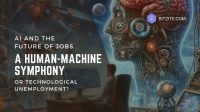With the proliferation of data in the digital age, market research has become an indispensable instrument for organizations aiming to attain a competitive advantage. The emergence of artificial intelligence (AI) as a technologiacally advanced solution to improve the efficacy and efficiency of market research processes is highly promising. This article will examine the diverse methods by which artificial intelligence (AI) can transform market research and furnish businesses with invaluable insights.
Collection and Analysis of Data
Artificial intelligence exceeds human capabilities in terms of speed and scope when it comes to collecting and analyzing enormous quantities of data. Tools propelled by artificial intelligence are capable of crawling news articles, websites, and social media platforms in order to collect pertinent data regarding competitor strategies, market trends, consumer behavior, and more. AI facilitates researchers’ access to exhaustive and current information that is critical for making well-informed business decisions through the automation of data collection tasks.
Natural Language Processing (NLP)
Intelligent systems possess a notable capability in comprehending and manipulating natural language. AI systems are capable of identifying sentiment, extracting critical insights, and detecting emergent trends through the analysis of customer feedback, reviews, and social media conversations by employing natural language processing techniques. Algorithms propelled by natural language processing (NLP) have the capability to classify, condense, and extract significant data from unstructured sources. This enables market researchers to gain invaluable insights pertaining to consumer preferences, levels of satisfaction, and brand reputation.
Predictive Forecasting and Analytics
By utilizing past data and identifying patterns, AI algorithms have the capability to produce predictive models that project forthcoming market trends and consumer behavior. Through the examination of historical sales data, customer demographics, and other pertinent factors, systems fueled by artificial intelligence have the capability to generate precise forecasts regarding demand trends, customer inclinations, and even prospective market oscillations. By leveraging data to inform decision-making, optimize marketing approaches, and forecast market fluctuations, organizations can attain a competitive edge in a dynamic business environment.
Customer Segmentation Improvements
Utilizing market research methodologies powered by AI can empower organizations to more precisely segment their intended demographic. Through the examination of extensive datasets, artificial intelligence algorithms have the capability to discern unique consumer segments predicated on demographics, purchase history, behavioral patterns, and personal preferences. By employing such a detailed level of segmentation, organizations are capable of customizing their product offerings, marketing campaigns, and strategies to align with the distinct requirements and inclinations of various customer segments. This, in turn, culminates in enhanced customer contentment and augmented financial gains.
Real-Time Monitoring of the Market
Delays in the accumulation and analysis of data are a common issue with conventional market research approaches, which can lead to obsolete insights and overlooked opportunities. On the contrary, AI technology facilitates real-time market monitoring through the ongoing collection and analysis of data from diverse origins. This enables enterprises to identify nascent trends, oversee the actions of rivals, and promptly adapt to shifts in the market. Real-time market insights enable organizations to maintain their competitive advantage and remain agile by facilitating timely strategic decision-making. This enables them to adapt to ever-changing market conditions.
Automation and Optimisation
By automating tedious and time-consuming market research duties, AI-powered tools have the capability to allocate valuable human resources towards more intricate interpretations and analyses. By leveraging AI, organizations can optimize their data acquisition, analysis, and reporting procedures, thereby diminishing the temporal and labor-intensive demands of conducting exhaustive market research. The enhanced efficiency allows market researchers to concentrate on the interpretation of insights, formulation of practical strategies, and provision of greater value to organizations.
Considerations of Ethics
Although the undeniable advantages of AI in market research cannot be overlooked, ethical concerns must be taken into account. The utmost importance is placed on privacy concerns, data security, and algorithmic biases when handling sensitive consumer information. Ensuring transparency and adherence to data protection regulations are fundamental for the ethical and responsible implementation of artificial intelligence. To create consumer confidence and safeguard their interests, organizations must prioritize ethical conduct, establish transparent protocols, and conduct routine assessments and audits of AI systems.
Conclusion
The potential for artificial intelligence to significantly transform market research lies in its ability to improve data capture, analysis, and prediction capabilities. By utilizing AI technology, organizations can expedite the acquisition of valuable insights, enable data-informed decision-making, and attain a competitive advantage in a marketplace that is perpetually evolving. Nevertheless, in order to establish consumer trust, it is critical to navigate the ethical complexities associated with AI and to place a premium on privacy and transparency. The ongoing progression of artificial intelligence (AI) in market research may yield more precise, streamlined, and implementable insights that assist organizations in their efforts to comprehend and fulfill the continuously evolving demands of their target demographic.



